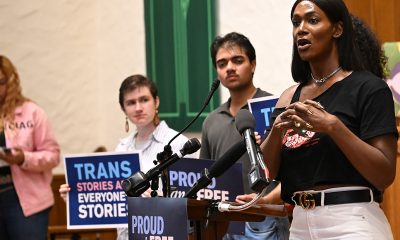Arts & Entertainment
Reel Affirmations returns
Abbreviated film festival features dramas, docs and comedies exploring a wide spectrum of LGBT life
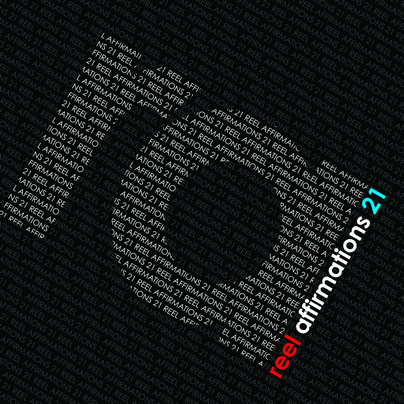
The Reel Affirmations Film Festival is scheduled to kick off tonight (Thursday) with screenings of “Kiss Me” and “I Do” (go here for reviews), but most of the films will be screened Friday and through the weekend at either the D.C. Jewish Community Center (1529 16th St., N.W.), the Goethe Institut (812 7th St., N.W.) or the Carnegie Institution for Science (1530 P St., N.W.).
Tickets start at $10 but various packages are available. Visit reelaffirmations.org to purchase or for more information. Also be sure to pick up a Blade-produced program book, which has all the information you need about the One in Ten event.
The program book contains descriptions but the Blade had exclusive access to review the films. Our critiques follow. Contributing writers are Patrick Folliard, Brian T. Carney, Robbie Barnett, Santiago Melli-Huber and Joey DiGuglielmo.
‘Molly’s Girl’
Friday, 7 p.m.
D.C. Jewish Community Center
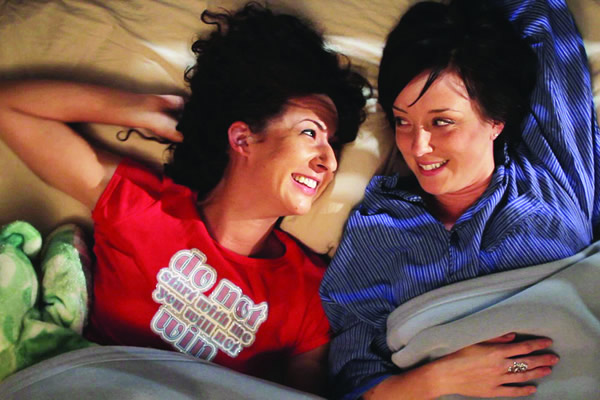 Everyone has that one clingy ex who can’t take no for an answer, but there are better ways to deal with it than in “Molly’s Girl.”
Everyone has that one clingy ex who can’t take no for an answer, but there are better ways to deal with it than in “Molly’s Girl.”
Molly (Kristina Valada-Viars) is a pathological liar and a straight girl, who has her first lesbian experience with Mercedes (Emily Schweitz), whose girlfriend broke up with her for focusing too much on her job as a gay rights activist. Mercedes has a drunken one-night stand with Molly, and Molly proceeds to stalk Mercedes to the point of violating a restraining order. Mercedes then learns that Molly is the daughter of an independent state senator whose opinion on LGBT rights she has been trying to sway.
Molly, desperate for attention and affection, agrees to Mercedes’ insane proposal to go to the senator’s house for a weekend under the guise of being an engaged couple. Mercedes believes it will make the senator vote in her favor. The plan is flawless, except for the fact that it blows up in everybody’s faces. Molly’s family has been tired of her lying and delusions for years and sees it as just another cry for attention.
Schweitz’s performance as Mercedes and her character development almost save the movie, but the premise of trying to trick a senator that way would ruin anybody’s career and probably do further damage to her cause. There are some genuinely funny moments and a couple of strong performances, but between the ill-conceived plot and the character of Molly, it’s only worth seeing if you enjoy clingy exes and disapproving families. (SMH)
‘Yossi’
Friday, 9 p.m.
D.C. Jewish Community Center
 “Yossi” is a sequel to the surprise Israeli gay indie hit “Yossi and Jagger” (2002). In the first movie, Yossi Guttman is a commander in the Israeli army stationed on the Lebanon border. When Lior joins the unit as Yossi’s second-in-command, the two begin a passionate but secret affair.
“Yossi” is a sequel to the surprise Israeli gay indie hit “Yossi and Jagger” (2002). In the first movie, Yossi Guttman is a commander in the Israeli army stationed on the Lebanon border. When Lior joins the unit as Yossi’s second-in-command, the two begin a passionate but secret affair.
Lior (who is called Jagger because he has “the moves like Jagger”) is killed in an ill-considered skirmish. Yossi goes to sit shiva with Lior’s family, but does not tell them about their relationship.
“Yossi” picks up the action 10 years later. Yossi is now Dr. Guttman, a successful cardiologist. But, despite his professional achievements, Yossi remains in an emotional and social fog. His well-meaning colleagues try to break him out of his shell. Despite rumors about his sexuality, Nina, a nurse, asks Yossi out on a date, and Moti, a fellow doctor, asks Yossi to be his wingman when he hits the bars to celebrate his divorce.
Yossi decides to return to return the region where he and Lior met. His plans are changed, however, when he encounters a group of rowdy young soldiers and slowly begins to drop his emotional barriers.
Surrounded by a strong cast, award-winning Israeli actor Ohad Knoller offers a powerful performance as Yossi. He amazingly brings Yossi’s stupor to vivid life, offering a rich and nuanced portrayal of a man frozen in place, but bravely trying to move forward. Knoller is achingly vulnerable as he makes the journey through a disastrous online hook-up (his date berates him for sending a picture of his younger and thinner self), his meeting with Lior’s family and his heart-rending emotional and physical undressing when he finally embraces a new lover.
Knoller is given strong support by writer Itay Segal and director Eytan Fox. The taut screenplay balances moments of solitary silence with a series of tense encounters and moves the action forward at an appropriately measured pace. The direction is strong and assured. Fox lets the camera linger on Knoller’s expressive face, but never lets the story lag.
In Hebrew, with English subtitles. (BTC)
‘Lesbiana’
Saturday, 11 a.m.
D.C. Jewish Community Center
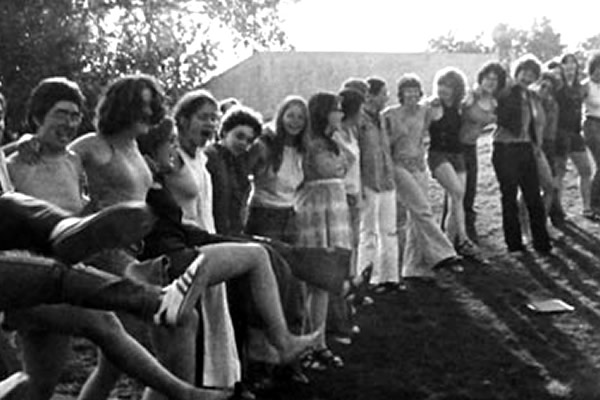 Tight (just 63 mins.) but with a leisurely feel, “Lesbiana” is a documentary about the separatist movement among lesbians and feminists in the ‘70s and ‘80s that found groups of women, to varying degrees, living in women-only communes on various beaches and rural lands all over the country.
Tight (just 63 mins.) but with a leisurely feel, “Lesbiana” is a documentary about the separatist movement among lesbians and feminists in the ‘70s and ‘80s that found groups of women, to varying degrees, living in women-only communes on various beaches and rural lands all over the country.
Recounted mostly by the women themselves — some now in their senior years — this piece from filmmaker Myriam Fougere (a participant herself) is a fascinating look into a world few in the LGBT world, even most lesbians, didn’t get to experience first hand. The era comes roaring to life through evocative first-hand testimony and archival stills and video footage. The film deftly balances the more philosophical and academic side of the convictions with stories from more “everyday”-type lesbians who share the more practical and experiential side of things. D.C.-based lesbian author Evelyn Torlon Becker makes a memorable appearance talking about her Jewish identity.
While the film never lags, it suffers from being a bit too vague. About half the testimony is from French-speaking Canadian lesbians (presented with subtitles), yet the geographic connections between them and their American counterparts are not so much as hinted at. The filmmaker introduces herself into the narrative, early on saying this is her story of her travels to find out whatever happened to many of these women, yet she disappears almost entirely from the rest of the piece which gives the film a dangling feeling. She deserves credit for not forcing herself too extensively into the work, but a bit more personal context would have been helpful.
Slightly clearer but still not fully explored are the arguments for separatist living and what the women hoped to gain from ridding themselves fully from patriarchy. Hearing these women tell their stories, one does get a sense of why they felt the way they did and how they interacted with each other at various music festivals and communal gathering places, yet the film could have used a bit more structure. We get little sense of the degree, if any, to which these women felt a sense of sisterhood with either straight feminists or urban lesbian feminists who chose not to sequester themselves. (JD)
‘Difficult Love’
Shown in a double bill with ‘Lesbiana’ (see above)
Photographer and visual activist Zanele Muholi takes us into her world through the eyes of her photographic lens in “Difficult Love.”
The subject of her activism and photography is black lesbians living day to day in her native country of South Africa. Rampant sexism and the legacy of Apartheid are the main issues Zanele challenges in her work. Even through extreme violence and homophobia, Zanele and other lesbians manage to embrace and celebrate their lives.
Through her photographs, Zanele humanizes women loving women in beautiful and inspiring images and has become something of a role model for lesbians in South Africa. It’s quite clear that she is a hero and positive force for these women who would otherwise go voiceless. Her photography is not the only thing showcased in this documentary. Zanele’s relationships with her subjects, friends and family are explored and these segments become some of the most poignant moments of the film. (RB)
Women’s shorts, various
Saturday, 1 p.m.
D.C. JCC
‘Mosquita y Mari’
Saturday, 3 p.m.
D.C. JCC
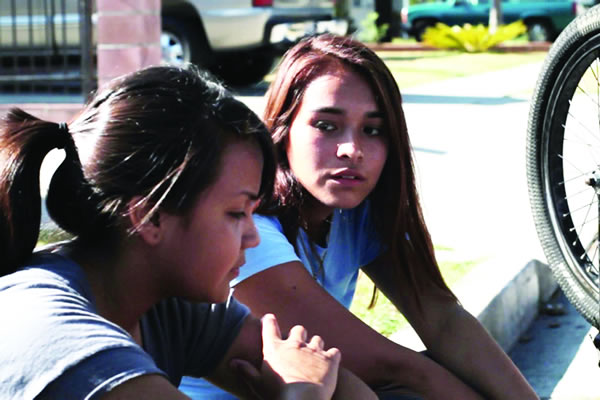 Written and directed by lesbian filmmaker Aurora Guerrero, “Mosquita y Mari” isn’t the usual coming-of-age story. Set against the gritty backdrop of Huntington Park, a working class Chicano neighborhood in Southeast Los Angeles, this heartening festival favorite portrays the tender friendship of teenage Latina classmates as they navigate adolescent confusion and family pressures to create an emotional refuge where they can be themselves.
Written and directed by lesbian filmmaker Aurora Guerrero, “Mosquita y Mari” isn’t the usual coming-of-age story. Set against the gritty backdrop of Huntington Park, a working class Chicano neighborhood in Southeast Los Angeles, this heartening festival favorite portrays the tender friendship of teenage Latina classmates as they navigate adolescent confusion and family pressures to create an emotional refuge where they can be themselves.
Though very different, the girls — Yolanda and Mari, played by Fenessa Pineda and Venecia Troncoso — are both typical of their community. Yolanda, a promising student and good girl, is the hope of her struggling parents’ ambition, their American dream. Her mother warns her to concentrate on school, saying, “I’m not busting my ass all day so you can throw it all away.”
Mari, on the other hand, smokes weed, shoplifts, and, though smart, pulls lousy grades. But she also works hard handing out fliers on Huntington Park’s busy main drag to help pay her undocumented family’s overdue bills. But interestingly, it’s shy but determined Yolanda who doggedly strives to make a connection when bad girl beauty Mari moves in across the street, and not the other way around.
Mari nicknames Yolanda “Mosquita” (“little fly” in Spanish). Initially it’s as a comment on her new acquaintance’s peskiness; but as the girls become friends the derisive tag changes into a term of endearment. They begin meeting after school in an abandoned body shop where they share confidences and Yolanda helps Mari with her homework. Rather rapidly, a mostly chaste romantic relationship develops.
A first time feature film director, Guerrero is a subtle but powerful storyteller. Her screenplay is based on her own life experiences. And even though the tale’s events aren’t particularly extraordinary, it feels completely unlike other films based on young gay love. Guerrero combines simplicity with authenticity to deliver something both searing and quietly touching.
Most of the characters are bilingual, switching fluidly from English to Spanish (Spanish dialogue is subtitled in English) depending on time and place; the film’s gorgeous Spanish language soundtrack and its location with bodegas, quinceañera shops, and lively street life reinforce the cultural connection. Pineda and Troncoso turn in astonishingly natural performances as the smitten teenagers.
While nothing about “Mosquita y Mari” is tied up neatly with a bow, it does end on a hopeful note. (PF)
‘Carl(a)’
Saturday, 5 p.m.
Goethe
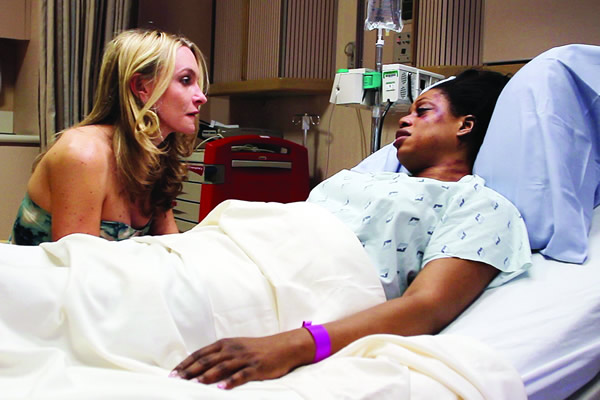 Will she or won’t she? When male-to-female pre-op transsexual Carla unexpectedly receives a surprisingly large inheritance from her grandfather, she can finally afford the gender reassignment surgery she’s always wanted. To move forward seems a no brainer. But like everything in Carla’s life, nothing is that simple.
Will she or won’t she? When male-to-female pre-op transsexual Carla unexpectedly receives a surprisingly large inheritance from her grandfather, she can finally afford the gender reassignment surgery she’s always wanted. To move forward seems a no brainer. But like everything in Carla’s life, nothing is that simple.
After a long losing streak with men, Carla (transgender actress Joslyn DeFreece) is enjoying a new and promising relationship, and therein lies the rub: Carla’s boyfriend Sam, a kindhearted, socially awkward nerd played by Gregg Bello, loves his transgender girlfriend just the way she is (anatomy and all). In fact, Sam is so opposed to Carla pursuing her life’s dream that he threatens to leave her should she go under the knife.
Carla loves Sam too, and truly wants to keep him in her life. Then again, she didn’t get this far on her journey toward claiming a true identity by doing what other people wanted.
When we first meet Carla, she is living alone, grappling with the problems that face a lot of transgender people: employment challenges, harassment and some family rejection (her parents and brother are openly hostile to her decision to transition). Fortunately, Carla finds a haven in both her understanding grandfather (feature film veteran Mark Margolis) and best pal Cinnamon (Laverne Cox), a feisty transgender streetwalker. (Cox garnered some fame a few years back as the first African-American transgender woman to appear on an American reality show when she was featured as a finalist on VH1′s “I Want to Work for Diddy.”)
Rather abruptly, Carla’s situation dramatically changes. How she deals with the newness of her life is what makes this film interesting. Directed by Eli Hershko, “Carl(a),” feels part love story, part “After School Special” for grownups, and a little P.S.A. (public service announcement). What could be too preachy is saved by leading lady DeFreece. Using her real life personal story and a light touch, DeFreece succeeds in both giving a terrifically honest performance and further acquainting audiences with the transgender experience. (PF)
‘Mixed Kebab’
Saturday, 7 p.m.
Goethe
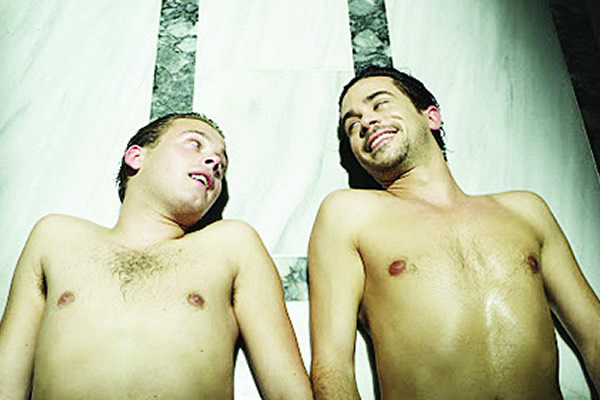 Coming out to your family can be disastrous, especially if your brother is psychotic.
Coming out to your family can be disastrous, especially if your brother is psychotic.
“Mixed Kebab” is a feature film written and directed by Guy Lee Thys. It stars Cem Akkanat as Bram and Simon Van Buyten as Kevin. The film explores the clash of religion and sexuality in an international setting.
Set in Belgium, Bram’s family arranged for him to marry his cousin Elif. Bram, however, secretly begins dating Kevin. Elif discovers this, but is determined to move to Belgium, live comfortably and marry Bram anyway. Bram’s brother Furkan joins an Islamic fundamentalist group with connections to the Taliban.
Furkan discovers Bram’s affair and exposes him to his family, who disown him when he refuses to marry Elif. Word of their son’s homosexuality spreads around the community and Bram’s parents are ostracized by those around them. In an attempt to redeem his family’s honor, Furkan plans to kill Kevin. Eventually, Bram is faced with a choice between his family and the love of his life.
The film is in about a half-dozen languages, making it difficult to follow at times, but many young gays and lesbians can relate to the choices Bram is constantly faced with. He must weigh his family’s expectations of him with what he wants and every decision he makes throughout the film hurts someone else in his life.
Parts of the plot make little sense, such as why Bram would bring Kevin with him on his trip to Turkey to meet Elif. However Akkanat and Van Buyten have great chemistry as a couple and carry the movie with the evolution of their relationship. (SMH)
‘Welcome to New York’
Saturday, 9 p.m.
Shown in a double bill with ‘Gayby’ (see below)
Goethe
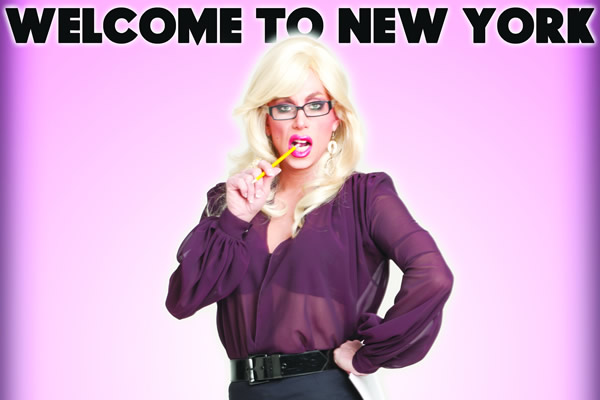 “Welcome to New York” is campy fun that plays like a pilot for a TV show that would air on the LOGO network and would fit right in with same audience that watches “RuPaul’s Drag Race.”
“Welcome to New York” is campy fun that plays like a pilot for a TV show that would air on the LOGO network and would fit right in with same audience that watches “RuPaul’s Drag Race.”
Famed drag queen Sherry Vine stars in this short film as Dr. Kitty Rosenblatt, a therapist to a bunch of whiny, young Big Apple newbies whose comedic stories of love in the city unravel during their separate therapy sessions. The amateur acting is redeemed by amusing situations. One segment has a drag queen telling Dr. Rosenblatt that she “did the nasty … with her face on,” while another centers around a character who cannot remember the name of his date. Perhaps you’ve been there?
In all, there are five stories. Though it’s only 30 minutes long, it feels as though it covers a lot of ground and leaves you wanting another episode. (RB)
‘Gayby’
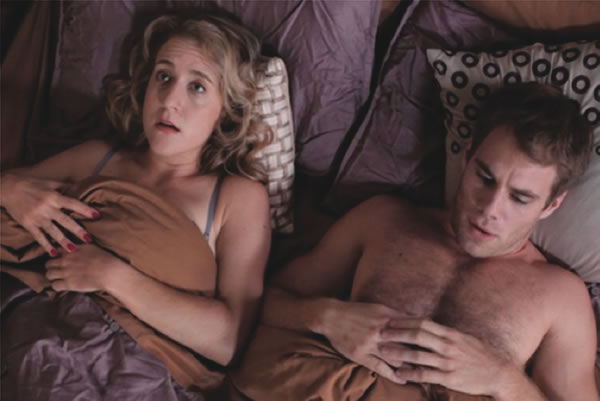 The plot of “Gayby” treads familiar ground. Despite an awkward one-night stand, college friends Jenn (straight) and Matt (gay) have remained BFFs. Now single and in their 30s, they decide to have a baby. A variety of hilarious hijinks and complicated emotions ensue, starting with Jenn’s decision that she wants to conceive “the old-fashioned way” (for no apparent reason other than the comic possibilities) and ending with the challenges of juggling baby care schedules.
The plot of “Gayby” treads familiar ground. Despite an awkward one-night stand, college friends Jenn (straight) and Matt (gay) have remained BFFs. Now single and in their 30s, they decide to have a baby. A variety of hilarious hijinks and complicated emotions ensue, starting with Jenn’s decision that she wants to conceive “the old-fashioned way” (for no apparent reason other than the comic possibilities) and ending with the challenges of juggling baby care schedules.
Fortunately, this familiar territory is freshened by a lively supporting cast, most notably Jonathan Lisecki as Matt’s flamboyant friend Nelson. Striking out on the dating scene, Nelson has recast himself as a bear, complete with a full beard, a new screen name (NellieBear8 — you can guess what the 8 stands for) and a delightfully fey growl. Beyond providing comic relief, Nelson also helps the plot lurch forward introducing Matt to online dating, teaching Matt and Jenn how to use a syringe when the “old-fashioned way” doesn’t work out, counseling Jenn through her “break-up” with Matt, and still finding time to find a boyfriend of his own.
Unfortunately, Lisecki’s work as writer and director is less assured than his work as actor. The feature-length version of “Gayby” started life as a 2010 short (a two-hander starring Jenn Harris and Matthew Wilkas, who also star in the full-length version) and the strain of expanding the material shows. The story meanders and the plot twists sometimes seem arbitrary. The tone is also uncertain; sometimes it’s not clear whether scenes are supposed to be comic or serious. The writing, however, is sharp, fast and furious; the zingers fly by quickly and enjoyably.
While the supporting cast is strong, Jenn Harris and Matt Wilkas are somewhat bland as the leads, a problem that is highlighted by the fact that both characters are just drifting through life. Jenn is a yoga instructor who is underappreciated by her boss. Matt works at a comic book store, blocked at working on his own comics and still not over his ex-boyfriend Tom. Harris has exquisite comic timing, but not enough opportunities for banter or physical comedy.
Their blandness is offset by the strong supporting cast and the witty writing, but Lisecki ultimately fails to bring the complex central relationship to life. He’s not alone on this. The same problem has plagued movies like “The Object of My Affection” and “The Next Best Thing” and TV shows like “Will & Grace.” It’s never easy for a gay guy and his straight gal pal.
Nonetheless, there are lots of laughs in Gayby, even if the whole is less than the sum of its parts. (BTC)
‘I Want Your Love’
Saturday, 11 p.m.
Goethe
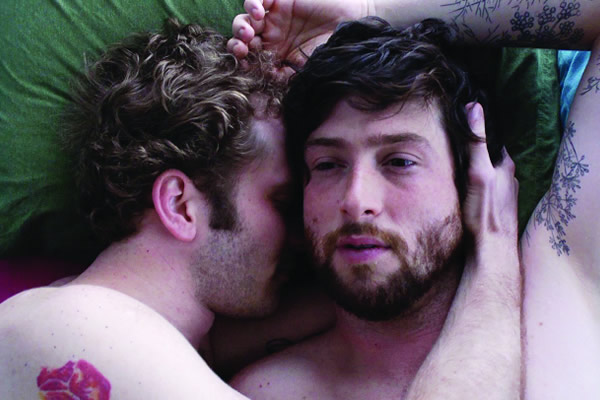 Following in the tradition of “Shortbus” (which showed real people having real sex in a variety of situations), “I Want Your Love” tells the story of eight gay men in San Francisco in explicit and searing detail. Over the course of 48 hours, the men test the boundaries of their relationships and stumble through decisions large and small.
Following in the tradition of “Shortbus” (which showed real people having real sex in a variety of situations), “I Want Your Love” tells the story of eight gay men in San Francisco in explicit and searing detail. Over the course of 48 hours, the men test the boundaries of their relationships and stumble through decisions large and small.
The central character is Jesse (Jesse Metzger), a 30-something performance artist. Still licking the wounds from his break-up, short on cash, creatively blocked and unable to get a foothold in San Francisco’s art scene, Jesse has decided to return to his family home in Ohio. (The trendy urbanites keep referring to the entire state and not Jesse’s hometown of Columbus.)
As Jesse prepares to leave the city, he says goodbye to his friends while avoiding his actual farewell party. He also avoids phone calls from his anxious family while finally settling emotional scores with his ex-boyfriend Ben (Ben Jasper) and Keith (Keith McDonald), his downstairs neighbor and a successful artist. In the meantime, his hairy hipster roommate uneasily prepares to move his younger boyfriend into the apartment and Jesse’s friend Brontez rekindles his acquaintance with Ben.
“I Want Your Love” is the first feature-length film by writer/director Travis Mathews, known for his series “In Their Room,” which documents what goes on in the bedrooms of gay men around the world. He also made the short film of the same title (2010), which also featured Metzger, but in a different scenario.
Mathews has degrees in both documentary filmmaking and counseling psychology and he puts them to excellent use here. The realistic dialogue and naturalistic camerawork beautifully capture the look and feel of contemporary San Francisco. The narrative is fleshed out (quite literally) by sexual encounters between the men. Although we see lots of body parts and bodily fluids, and although the film was produced by adult film distributor Naked Sword, this movie is hardly your standard porn flick.
The intimate physical contact details the relationships between the characters in fascinating ways and touch is often a more effective means of communication (between characters and between the film and the audience) than words.
The graphic nature of “I Want Your Love” may not be for all tastes, but it offers intriguing insights into the many ways gay men connect with each other. (BTC)
‘Entry Denied’
Shown in a double bill with ‘The Queen Has No Crown’ (see below)
Sunday, 11 a.m.
Carnegie
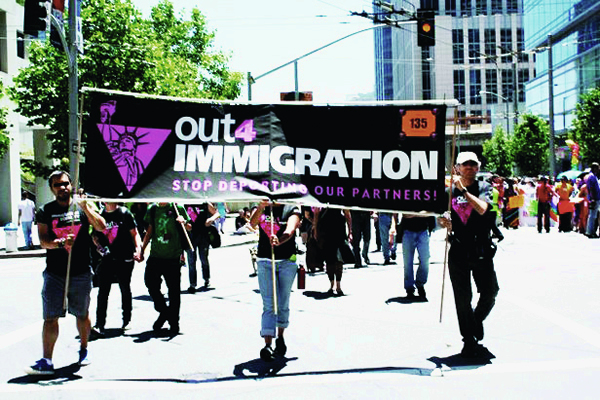 The stories of three same-sex international couples are explored in this short about the strict and unfair U.S. immigration policies gay couples face.
The stories of three same-sex international couples are explored in this short about the strict and unfair U.S. immigration policies gay couples face.
Seeing the personal stories of those affected shows just how hard these couples struggle to stay together while risking deportation when one is not a U.S. citizen.
For one couple, things are further complicated by an HIV diagnosis. Up until 2010 an HIV ban restricted any travel or immigration into the U.S. by those infected. Another couple makes the decision to move out of the U.S. altogether and find solace in Canada, which accepts the immigration of gay couples. Each story is both sad and frustrating, but sheds light on this tragic situation. It’s clear the goals of the filmmakers were to raise awareness on this issue and they succeed. (RB)
‘The Queen Has No Crown’
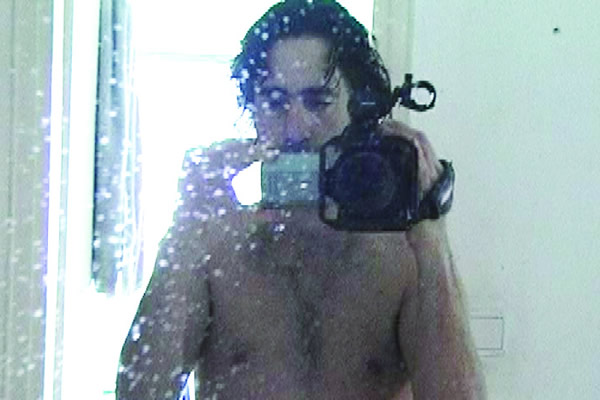 An Israeli man documents life with his parents, siblings, nieces and nephews and their views on his sexuality, but his emotionally dependent mother is the main focus.
An Israeli man documents life with his parents, siblings, nieces and nephews and their views on his sexuality, but his emotionally dependent mother is the main focus.
“The Queen Has No Crown” is a bio-documentary from Tomer Heymann that combines home movies with his own footage of his family and friends. He asks them about their lives, their thoughts on his homosexuality and his relationships. Through the years, his parents divorce and three of his four siblings move from Israel to America, much to his mother’s chagrin.
His mother looks back on her life, everything she missed out on and the growing divide between her and her state-side sons. While she believes they should all stay in Israel, Tomer tries to reason with her, saying they are happy in America and she should be happy for them. Meanwhile, Tomer pours his energy into his relationship with Erez, whom he wants to marry. Erez leaves Tomer who delves into the local gay community and its nightlife, despite harsh anti-gay protests.
The film was shot by Heymann with a handheld camera over the course of 10 years and features a cringe-worthy conversation between Tomer and his twin, also named Erez, about how Tomer is selfish for being gay and not reproducing.
Every frame of the film is worth seeing. The ending does leave something to be desired in terms of a resolution but does a wonderful job highlighting Tomer’s mother’s disappointment in how her son sees her. (SMH)
‘Trans’
Shown in a double bill with ‘Mathi(eu)’ (see below)
Sunday, 1 p.m.
Carnegie
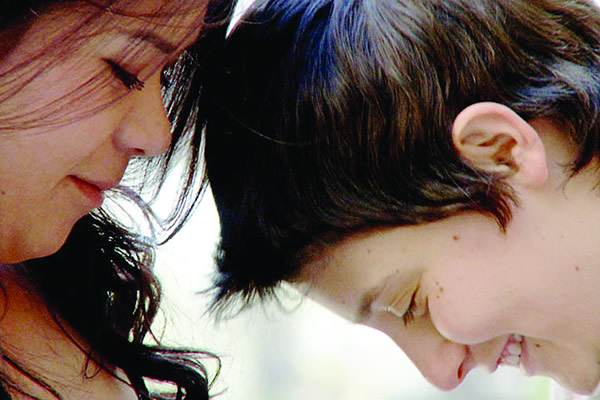 Flawed yet fascinating, “Trans” is a 96-minute documentary that shares a wide variety of transgender experiences — everything from a young child born male who insists she’s a girl to her remarkably accommodating parents, to a trans surgeon overachiever who manages to conceive twins with her partner, to two middle-aged trans women who transition later in life to the sad story of Justin/Chloe, a California teen who commits suicide overwhelmed by what she felt were a lack of options.
Flawed yet fascinating, “Trans” is a 96-minute documentary that shares a wide variety of transgender experiences — everything from a young child born male who insists she’s a girl to her remarkably accommodating parents, to a trans surgeon overachiever who manages to conceive twins with her partner, to two middle-aged trans women who transition later in life to the sad story of Justin/Chloe, a California teen who commits suicide overwhelmed by what she felt were a lack of options.
While always interesting and touching, “Trans” for many LGBT viewers will feel a bit tired. That’s not a slight at all at the subjects — their stories are always engrossing. But trans issues, thankfully, are integrated enough into LGBT U.S. culture to the point that, by now, viewers, especially at an LGBT film festival, don’t really need first-hand tutorials on what it means to be trans or how these realizations come about. Most of us, again thankfully, get it — trans folks feel trapped in the wrong biological body, it’s really not an esoteric concept. So while there’s a large degree of a “preaching-to-the-choir” feel to this, if straights would give it the time of day, it would likely find a more appropriate audience.
And while its intentions are always noble — one can’t help but tear up at several of the personal accounts — director Chris Arnold often takes a disappointingly hammy approach. Arnold successfully gets a camera present for key moments in several lives — two women being wheeled into the operating room for gender reassignment surgery, a young man telling his girlfriend he’s more trans than lesbian and the surgeon’s wife giving birth. But just as often, things get melodramatic — a graphic saying “surgery” flashes while ominous-sounding cellos thud out scary chords. Other key moments meant to be narrative surprises can be detected a mile away. And did we really need to see one man’s removed testicles being placed in a vial? D.C. trans activist Earline Budd makes a brief appearance.
The film ultimately works, though, as the power of the individual stories manages to overpower Arnold’s hardworking-yet-melodramatic approach. And, as always, the stories are what make the issues come to life and resonate. (JD)
‘Mathi(eu)’
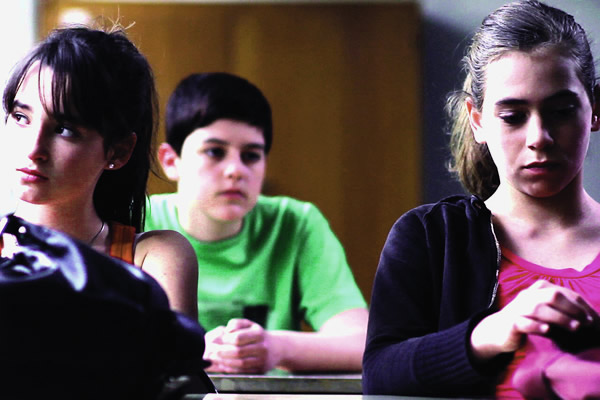 A young transgender student struggles to find love and yearns for people to see him as he sees himself.
A young transgender student struggles to find love and yearns for people to see him as he sees himself.
“Mathi(eu)” tells the story of Mathilde (Tomy Kleinermanns), who prefers to go by Mathieu while undergoing hormone treatment to transition to a man. He dreams of undergoing gender reassignment surgery but laments to his accepting mother that he’ll never be able to impregnate his future wife. She assures him his life will get better. Her role is minimal, but it’s clear she is a wonderful support system for Mathieu.
Mathieu develops a relationship with fellow student Laure (Valentine Feral), who is initially hesitant, saying she doesn’t date women. Soon enough, she begins seeing Mathieu as a man and the two grow close. However, her homophobic friend disapproves and threatens violence against Mathieu.
A touching scene early in their courtship shows Mathieu serenading Laure on the piano with a beautiful rendition of Edith Piaf’s “La Vie en Rose.” Laure joins in despite her initial reluctance to sing. They share their present worries and their hopes for the future. Their budding romance is cute, but doomed.
The film is just under 19 minutes long and entirely in French. It accurately depicts the struggles of a bullied teenager trying to understand his body and future. Laure herself struggles to understand Mathieu. The characters’ choices are believable and the Kleinermanns gives a brilliant performance as Mathieu from the first scene to his last glare. The movie is a must-see. (SMH)
‘Stud Life’
Sunday, 3 p.m.
Carnegie
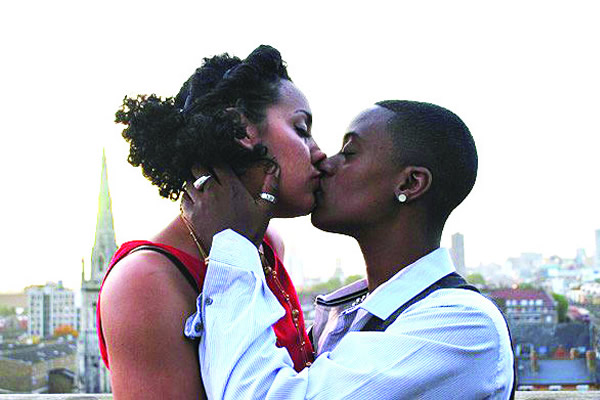 Balancing relationships and friendships is tough when your girlfriend and best friend don’t get along.
Balancing relationships and friendships is tough when your girlfriend and best friend don’t get along.
“Stud Life,” a British film starring T’Nia Miller and Kyle Treslove, depicts a challenge many relationships face, but in the context of a same-sex couple. JJ (T’Nia Miller) begins dating Elle (Robyn Kerr), which puts a strain on her friendship with Seb (Kyle Treslove), leading to several fights and break-ups.
While many conflicts in the film are dependent on the characters’ sexualities, including arguments about femme and butch lesbians, anyone can relate to the dynamic of JJ and Elle’s relationship in the first half of the film. JJ struggles, with little success, to balance her commitments to her girlfriend and her best friend. The drama, however, becomes harder to relate to when it is revealed that Elle works as a dominatrix. This revelation angers JJ not because of the nature of the job itself, but because Elle’s clients are men, so they break up.
Meanwhile, Seb spends a significant amount of time cruising for men online, which leads to a nasty encounter between a trick’s foot and Seb’s stomach. Seb then immediately develops a relationship with Smack Jack (Simon Savory), a drug dealing college student. The whirlwind romance felt contrived and predictable, as Seb spent most of the movie spurning him. Also, Jack had the audacity to insult someone else’s taste in clothes, which is ridiculous considering that throughout the movie, he wears, exclusively, an all-white suit.
The dialogue is, at times, difficult to understand, given the quick exchanges and British colloquialisms, and some scenarios are implausible at best. However, the relationship dynamics are the highlight of the film. (SMH)
‘Bear City 2’
Sunday, 7 p.m.
(also Nov. 9 at 7 and 9 p.m.)
Carnegie
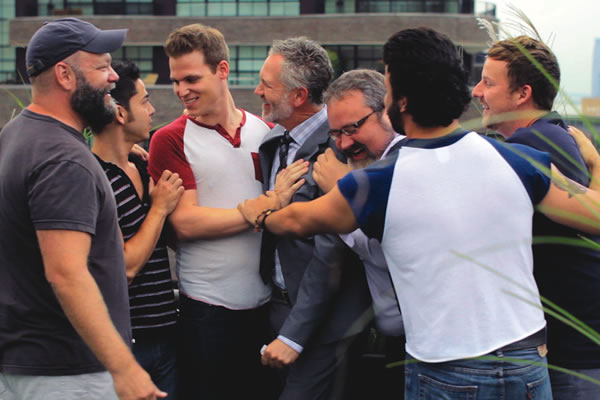 “Bear City 2” is a sequel to the popular “Bear City” (2010), a love story between Ty, a struggling actor and chaser, and Roger, a successful businessman who hangs out with the muscle bears (even though he’s not really a bear himself).
“Bear City 2” is a sequel to the popular “Bear City” (2010), a love story between Ty, a struggling actor and chaser, and Roger, a successful businessman who hangs out with the muscle bears (even though he’s not really a bear himself).
They’re surrounded by a circle of funny friends — neurotic unemployed Michael and his incredibly understanding lover Carlos, aspiring-but-unmotivated filmmaker Fred and his acerbic boyfriend Brent, and Simon, Ty’s twink friend who is confused but supportive when Ty “comes out” as a chaser.
“Bear City 2” starts out with a confusing prologue that includes cameos by Kevin Smith and Frank DeCaro and reintroduces the characters. It’s not clear how much time has elapsed between the movies. Somehow, Michael has acquired a Tony nomination and Carlos has bought a bar, and since marriage is now legal in New York, Roger has decided to propose to Ty. After a few moments of soul-searching, Ty says yes. The cast heads off to Provincetown for a Bear Week wedding.
Unfortunately, “Bear City 2” inherits some of the flaws of its predecessor and feels like it was rushed into production following the success of the first movie. Both are written and directed by Douglas Langway. The writing is frequently formulaic, relying on stock characters and situations, and the acting is uneven. There is a palpable lack of chemistry between Joe Conti and Gerald McCullouch as Ty and Roger. McCullouch is awkwardly miscast. His performance in both movies is dull and he’s not Ty’s type. Their physical mismatch does become an issue in the second movie, but it is hard to see why these two ever got together.
Despite these flaws, the film is clearly a labor of love for everyone involved and that passion shows in every frame. Partly financed by fans, their names and faces are shown in the credits and some appear as extras. And the movie is a joyous exploration and celebration of bear culture. It is wonderful (and unusual) to see guys with big bellies and fur portrayed as sexual objects. “Bear City 2” displays these bodies with pride, both in the principal cast and in crowd shots of bears on the beach. (BTC)

‘A Wrinkle in Time’
Through July 20
Arena Stage
1101 Sixth St., S.W.
Tickets range from $59-$209
Arenastage.org
Currently at Arena Stage, talented out actor and singer Taylor Iman Jones is rekindling an old friendship with an adored character of fiction.
Broadway vet Jones is starring as 13-year-old Meg Murry in “A Wrinkle in Time,” the world-premiere musical adaptation of Madeleine L’Engle’s same-titled book.
For many readers, especially women, the classic 1962 young adult novel, was their first foray into sci-fi, particularly one with a female protagonist.
The story centers on Meg, an awkward schoolgirl whose physicist father has mysteriously disappeared. Now, Meg, her popular friend Calvin, and smart younger brother Charles Wallace are tasked with moving through time and space to find him. Along the way they encounter adventure and evil.
For Jones, 33, playing 13-year-old Meg feels freeing in ways. She says, “As you get older, you’re told to grow up, so I like letting go of some of that. To feel feelings in their rawest form and to tap back into that is fun. I like the spontaneity. There are highs and lows to revisit.”
Born and raised in the San Francisco Bay Area, Jones began piano lessons at just six and soon added band and plays to their pursuits. Following high school, she made a deep dive into California theater for seven years before making the big move to New York in 2017 where after just two months she was singing on Broadway.
The determined and appealing Jones, who lives in New York with their partner, boasts an impressive bio. She has appeared on Broadway as Catherine Parr, Henry VIII’s sixth and final wife in Six, and in the original casts of “Head Over Heels” and “Groundhog Day.” She’s been seen in national tours of “Hamilton” and “American Idiot.”
WASHINGTON BLADE: It seems “A Wrinkle in Time” and Meg mean a lot to a lot of people.
TAYLOR IMAN JONES: The book tells the story of a girl with so much undiscovered power who’s accomplishing things she never imagined that she could.
BLADE: Can you relate?
JONES: Meg wears her emotions on her sleeve. I can certainly relate to that. I’m a Pisces. Sometimes being hyperemotional and very empathetic can feel like a burden, but as I’ve matured, I have realized that it’s not a bad quality. And it’s something I’ve learned to harness and to enjoy. I love that I can play a role like Meg in front of thousands of people.
BLADE: Was “Wrinkle in Time” a book you knew well?
JONES: Oh yeah, it’s a favorite book that lives in my heart and my mind. It’s one of the first books that taught me about the adventure of reading.
BLADE: And playing a favorite character must be a kick.
JONES: It really is.
BLADE: Meg is a big part in a big show.
JONES: This musical is huge. They’re traveling through space and meeting people on different planets. 20-person cast. 30 songs in the show. Quite the undertaking and I’m proud of us. I’m on stage for the entire musical and I sing four or five numbers.
As a mezzo soprano I guess you’d say I have the luxury of being able to do a lot of musicals that span a lot of different genres: rock musical, pop musical, and standards. “A Wrinkle in Time” is contemporary musical theater.
For me, singing is probably the least difficult part of the show. What’s harder for me is the way Meg experiences trauma; I need to be careful when I’m screaming and yelling.
BLADE: It seems mostly women have been involved in making this production happen (book by Lauren Yee; music and lyrics by Heather Christian; directed by Lee Sunday Evans; and choreography by Ani Taj.)
JONES: It’s true, the director, writer, etc., and most of our producers are all women. This doesn’t happen most of the time. For me it means new ideas and fresh energy, and pushing the limits of musical theater.
It’s also created a wonderful space in which to work. It can be more generous, and understanding. And centering the story on a young girl is something we can all relate to.
BLADE: Will “A Wrinkle in Time” resonate with queer theatergoers and their families?
JONES: I think so, especially on the heels of pride month. It’s truly a show for all ages about finding your inner strength and fighting for the things that you love; not letting evil win over the power of good, and not just for yourself but for those around you too.
Movies
Two new documentaries highlight trans history
‘I’m Your Venus’ on Netflix, ‘Enigma’ on HBO/Max

One of the most telling things about queer history is that so much of it has to be gleaned by reading between the lines.
There are the obvious tentpoles: the activism, the politics, the names and accomplishments of key cultural heroes. Without the stories of lived experience behind them, however, these things are mere information; to connect with these facts on a personal level requires relatable everyday detail — and for most of our past, such things could only be discussed in secret.
In recent decades, thanks to increased societal acceptance, there’s been a new sense of academic “legitimacy” bestowed upon the scholarship of queer history, and much has been illuminated that was once kept in the dark. The once-repressed expressions of our queer ancestors now allow us to see our reflections staring back at us through the centuries, and connect us to them in a way that feels personal.
One of the most effective formats for building that connection, naturally enough, is documentary filmmaking — an assertion illustrated by two new docs, each focused on figures whose lives are intertwined with the evolution of modern trans culture.
“I’m Your Venus,” now streaming on Netfllix, bookends an iconic documentary from the past: “Paris is Burning (1990), Jennie Livingston’s seminal portrait of New York City’s ballroom scene of the ‘80s. In that film, a young trans woman named Venus Xtravagana delivered first-person confessionals for the camera that instantly won the hearts of audiences — only for them to break with the shattering revelation that she had been murdered before the film’s completion.
That 1988 murder was never solved, but Venus — whose surname was Pellagatti before she joined the House of Xtravaganza – was never forgotten; four decades later, her family (or rather, families) want some answers, and filmmaker Kimberly Reed follows her biological siblings — Joe, Louie, and John, Jr. — as they connect with her ballroom clan in an effort to bring closure to her loss; with the help of trans advocates, they succeed in getting her murder case re-opened, and work to achieve a posthumous legal name change to honor her memory and solidify her legacy.
It’s a remarkably kind and unapologetically sentimental chronicle of events, especially considering the brutal circumstances of Venus’ killing — a brutal death by strangling, almost certainly perpetrated by a transphobic “john” who left her body hidden under a mattress in a seedy hotel — and her decision to leave her birth family for a chosen one. As to the latter, there are no hard feelings among her blood relatives, who assert — mostly convincingly — that they always accepted her for who she was; one senses that a lot of inner growth has contributed to the Pallagatti clan’s mission, which admittedly sometimes resembles an attempt at making amends. For the murder itself, it’s best to leave that part of the story unspoiled — though it’s fair to say that any answers which may or may not have been found are overshadowed by the spirit of love, dignity, and determination that underscore the search for them, however performative some of it might occasionally feel. Ultimately, Venus is still the star of the show, her authentic and unvarnished truth remaining eloquent despite the passage of more than 40 years.
Perhaps more layered and certainly more provocative, documentarian Zackary Drucker’s “Enigma” (now streaming on HBO/Max) delves further back into trans history, tracing the parallel lives of two women — trans pioneer and activist April Ashley and self-styled European “disco queen” Amanda Lear — whose paths to fame both began in Paris of the 1950s, where they were friends and performers together at Le Carrousel, a notorious-and-popular drag cabaret that attracted the glitterati of Europe.
Ashley (who died at 86 in 2021) was a former merchant seaman from Liverpool whose “underground” success as a drag performer funded a successful gender reassignment surgery and led to a career as a fashion model, as well as her elevation-by-wedding into British high society — though the marriage was annulled after she was publicly outed by a friend, despite her husband’s awareness of her trans identity at the time of their marriage. She went on to become a formidable advocate for trans acceptance, and for environmental organizations like Greenpeace, who would earn an MBE for her efforts, and wrote an autobiography in which she shared candid stories about her experiences and relationships as part of the “exotic” Parisian scene from which she launched her later life.
The other figure profiled by “Enigma” — and possibly the one to which its title most directly refers — is Amanda Lear, who also (“allegedly”) started her rise to fame at Le Carrousel before embarking on a later career that would include fashion modeling, pop stardom, and a long-term friendship with surrealist painter Salvador Dalí. A self-proclaimed “disco queen” whose success in Europe never quite spread to American culture (despite highly public associations with musical icons like David Bowie and Roxy Music), Lear’s trajectory has taken her in a different direction than Ashley’s. In the film’s extensive live interview segments, she repeatedly denies and discredits suggestions of her trans identity, sticking to a long-maintained script in which any and all details of her origins are obscured and denied as a matter of course.
At times, it’s almost amusing to observe her performative (there’s that word again) denials, which occasionally approach a kind of deliberate “camp” absurdity in their adamance, but there’s also a kind of grudging respect that’s inspired by the sheer doggedness with which she insists on controlling the narrative — however misguided it may seem to those of us on the outside. Debate about her gender-at-birth has continued for decades, even predating Ashley’s book, so the movie’s “revelations” are hardly new, nor even particularly controversial — but her insistence on discrediting them provides sharp contrast with the casual candor of Ashley’s elegantly confident persona, underscoring the different responses to transphobia that would direct the separate lives of both these former (alleged) friends.
For what it’s worth, Lear sent an email to the Washington Post, calling the movie “a pathetic piece of trash” and denying not just her trans identity but any friendship or association with Ashley, despite ample photographic and anecdotal evidence to the contrary — and while it might come across as callous or desperate for her to maintain the presumed façade, it’s a powerful testament to the power of cultural bullying to suppress the truth of queer existence; the contrast between the life each of these women chose to live speaks volumes, and makes “Enigma” into one of the most interesting — and truthful — trans documentaries to emerge thus far.
While neither film presents a comprehensive or definitive view of trans experience (is such a thing even possible, really?), both offer a perspective on the past which both honors the truth of queer existence and illustrates the ways in which the stigma imposed by mainstream prejudice can shape our responses to the identity through which we are perceived by the public.
That makes them both worth your attention, especially when our queer history — and the acknowledgement of trans existence itself — is at risk or being rolled right back up into the closet.
Sports
Trans cyclist’s victory sparks outrage in conservative media
Katheryn Phillips is originally from DC

On the heels of UPenn erasing the record of the first openly transgender NCAA Division I All-American swimmer and the U.S. Supreme Court’s decision to tackle bans on trans student-athletes, right wing media is now all hot and bothered about the latest trans woman who won a cycling championship — even though she competed according to the rules.
On Tuesday, 58-year-old Katheryn Phillips finished first in USA Cycling’s Lyons Masters National Championship race for women aged 55-59, with a time of 1:42:10, according to the official results posted by the organization. The record shows her gender as “F” for female.
One second behind Phillips was Julie Peterson, with a time of 1:42:11 — as were three other cyclists: Mary Beth Grier, Andrea Cherniak-Tyson, and Carolyn Maddox.
Peterson, 57, was so outraged, she told Fox News she refused to stand on the podium in second place next to Phillips. Her story was swiftly shared by the New York Post (also owned by Fox’s parent company News Corp.), the Daily Mail, Breitbart, and other conservative media.
Both Peterson and another competitor are accusing USA Cycling of “hiding” that a transgender woman had registered to race.
“It was hidden from us. Katheryn Phillips, KJ’s name, was not on that list. And I checked it up all the way to the point of closure when we couldn’t register online anymore,” Debbie Milne told Fox.
“If I had known, I wouldn’t have spent thousands of dollars in travel and time off work to come and do a race,” Peterson said. Fox welcomed Milne, 56, who finished seventh on Tuesday, to Fox & Friends Thursday morning.
(Video courtesy of Fox News)
Peterson told Fox she did complain to USA Cycling officials prior to the race. Both Milne and Peterson referred to Phillips as a male, and with “he/him” pronouns.
“To be fair to all humans, if we want to say ‘him’ or ‘her,’ he was born a biological male, that is a fact,” Milne said. “And that is the thing that makes it an unfair advantage. Whatever has happened after that is a whole different topic.”
“I said, ‘I don’t want to race against a man,’ and they quickly scolded me and said ‘Oh, you can’t call him a man,’ and I’m like ‘Well, he is a man,’ so I was quickly scolded and corrected that it is a woman and I don’t even know what to say.”
USA Cycling did not respond to the Washington Blade’s emails requesting comment.
Phillips, who goes by Kate and by “KJ,” is a former rugby player with the D.C. Furies, who stated in the comments of a 2024 article published by Zwift Insider that she was the first out trans athlete in the U.S. to compete under the 2004 International Olympic Committee’s guidelines on trans participation.
“When USA Rugby told me about the IOC decision in 2004, I raised my hand to be included. I experience nothing but joy when I play, ride, and race,” Phillips said.
As the Blade has reported, the International Olympic Committee drastically revised those rules in 2021, and in March, Republican lawmakers in D.C. demanded the IOC ban trans female athletes from women’s sporting events altogether.
The Blade also reached out to Phillips for comment but as of press time we have not received a response. She told Zwift Insider in March 2024 she does not let those who disapprove or spread hate impact her performance or her attitude.
“I am unaffected by dissent. I love, I share joy, I am me, and I have been my authentic self for decades,” she said. It’s been reported Phillips came out in 1999, and told Zwift Insider she considers herself a lifelong cyclist.
“I’ve been on a bike for as long as I can remember,” said Phillips. “As kids, my friends and I rode all over town, we were feral kids; no cell phones, no trackers … we just roamed, and nobody got in trouble or hurt bad enough not to ride home … Scrapes/bruises/cuts were not an issue for us. In my teens, I worked for myself as a court/legal messenger, doing all of the work via my bike until I got a car. Raced BMX as a kiddo (when I mowed lawns to cover the race entry fees), I did MTB stuff (non-racing) and Sprint/Olympic Triathlons in my 30’s, and now I’m racing on Zwift, Road/Gravel, and CX in my 50s.”
In the comments section, Phillips made clear she’s not competing to win.
“I don’t do sports for victory, I do it because like many other women, I am an athlete to my core,” she said. “Unlike some, I am not there to WIN, I am there to do my best with the competitors and teammates I have around me trying to do the same…we are in it for the experience. I rejoice in their wins, and a lot of joy is reflected back to me when I have a good day.”
-

 U.S. Supreme Court2 days ago
U.S. Supreme Court2 days agoSupreme Court to consider bans on trans athletes in school sports
-

 Out & About2 days ago
Out & About2 days agoCelebrate the Fourth of July the gay way!
-

 Virginia2 days ago
Virginia2 days agoVa. court allows conversion therapy despite law banning it
-

 Maryland4 days ago
Maryland4 days agoLGBTQ suicide prevention hotline option is going away. Here’s where else to go in Md.

